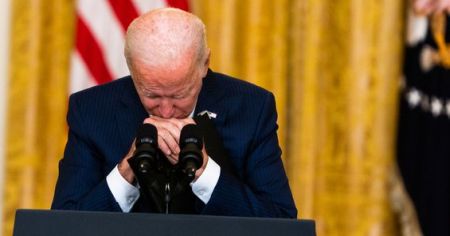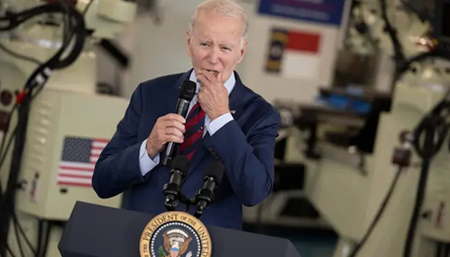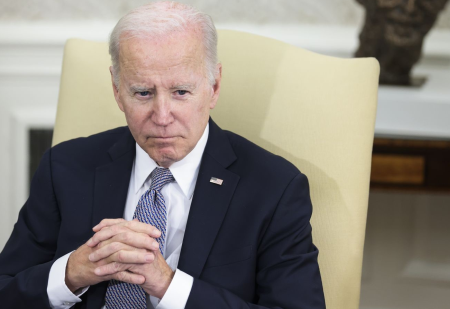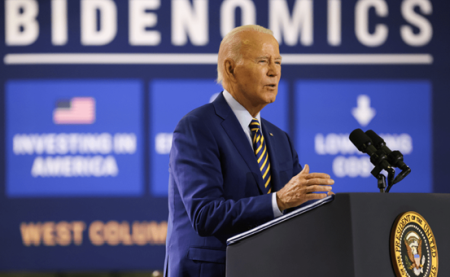Asking voters to trust him in the future? That's quite different than pointing to concrete results.
WASHINGTON, D.C. (Texas Insider Report) — Inflation, the high “cost of living,” and “jobs & the economy” have been some of the highest-ranking voter concerns in polls since before the mid-term elections. Families are continuing to pay more for goods and services than they were before the pandemic – and may also be locked into high rents or mortgages, which means they’ll continue to feel squeezed even if inflation goes down.
So, President Biden is trying to change that narrative. It's likely to hold the key to his re-election, should he be the Democrat nominee in 2023.
Mr. Biden may be trying to sell Middle-Class Americans that the economy is doing well, but, Americans just don’t believe it.
 American voters have said they've been displeased with Biden’s handling of the economy since he moved into the job. An Associated Press/NORC Center for Public Affairs Research poll from June found that:
American voters have said they've been displeased with Biden’s handling of the economy since he moved into the job. An Associated Press/NORC Center for Public Affairs Research poll from June found that:
- Just 34% "approved" his handling of the economy,
- barely up from 33% from the same pollster in May.
- A Gallup Poll in April found that 64% of Americans had "little" or "almost no confidence" in Biden on economic issues.
- And in a recent Navigator Research poll of Registered Voters just over 25% of Democrats "strongly approved" of Biden’s handling of economic issues,
- while 46% "somewhat approved."
Those feelings among so many Democrats is a problem for a president who’s trying to convince the country that his economic policies can improve their lives.
In what was billed as a major speech in Chicago last month, Mr. Biden introduced his economic messaging by focusing on the middle class, infrastructure "investments," and job creation.
“Bidenomics is about the future,” he said. “Bidenomics is just another way of saying ‘restore the American Dream because it worked before.’”
But that message may be hard to sell, because arguably those economic shifts haven’t led to dramatic improvements in most Americans’ day-to-day lives.
As the U.S. economy came out of the COVID-19 pandemic and shutdowns, Biden's policies have been marked by record-high inflation, and nearly a year of historic interest rate hikes from the Federal Reserve.
That’s left economists forecasting a recession like a dark cloud on the horizon. And, what small wage improvements may have been seen – and more or voter's paychecks – were quickly eaten up by that inflation.
 Add all of this together and it’s not hard to understand why even some Democrats are feeling kind of blah about the economy, and why they might not be too excited about Biden’s promises for the future.
Add all of this together and it’s not hard to understand why even some Democrats are feeling kind of blah about the economy, and why they might not be too excited about Biden’s promises for the future.
While it’s numerically true that the economy added millions of jobs under Biden, but that’s a circumstance of when he took office. The pandemic and resulting economic shutdowns created a deep and sudden recession in the spring of 2020, when millions of Americans lost their jobs in the span of a few weeks. But the recovery began under former President Donald Trump, and Biden came in during the upward swing. And much of the job growth has been in industries disproportionately impacted by the pandemic.
And it’s not clear that the job market will continue to boom – or that people are all that happy with it. In June, unemployment remained low but job growth slowed somewhat, according to the Bureau of Labor Statistics. A slim majority of workers are extremely or very satisfied with their jobs overall, according to a Pew Research Center survey from March, but only 34% say they’re satisfied with how much they’re paid.
Meanwhile, inflation remains high, at just over 4%, down from a peak of 9.1% a year ago, a 41-year high.
“And those things are not adjusted for inflation.”
And some of the recent gains for low-wage work may be temporary.
Biden-era policies were actually responsible for some of that wage growth among the lowest-earning workers. Pandemic-era programs like enhanced unemployment benefits and child tax credits gave low-income workers the cushion they needed to be able to look for new jobs with higher wages. But much of that assistance is gone or is drying up, and the gains could disappear.
In a recent Echelon Insights Poll from June, more specifics about voter's concerns can be found.
 Respondents were allowed to choose a hypothetical 3rd Party that could get their votes. A plurality of Democrats said they wanted a party that would,
Respondents were allowed to choose a hypothetical 3rd Party that could get their votes. A plurality of Democrats said they wanted a party that would,
- “Put the middle class first, pass universal health insurance, strengthen labor unions, and raise taxes on the wealthy.”
- This option had support from
- 31% of all respondents, and
- 45% of Democrats
That may be the kind of agenda that Joe Biden and the White House say he has – but Americans will have to be convinced that Mr. Biden has delivered on virtually any of it.
And asking voters to trust him in the future? Well, that's quite different than pointing to concrete results.
























